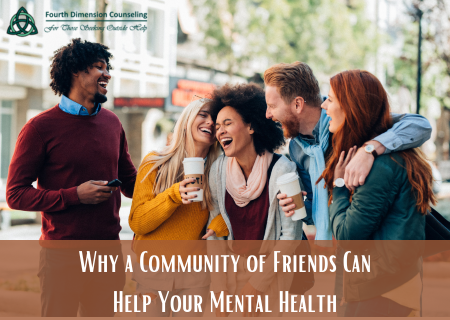 Our relationships with others have a significant impact on our mental and emotional wellbeing. Having a strong community of friends and social connections can help boost your mental health in many ways.
Our relationships with others have a significant impact on our mental and emotional wellbeing. Having a strong community of friends and social connections can help boost your mental health in many ways.
- Reduces stress and anxiety. Social interaction releases oxytocin, a hormone that counteracts stress and anxiety. Spending time with friends can help lower stress levels and make you feel more at ease. Laughing and engaging in playful interactions also releases endorphins that improve your mood and act as natural stress relievers.
- Provides support. Friends provide emotional support by listening without judgment and offering empathy and compassion. Knowing you have people who care about you and support you through challenges can help you feel less alone and better able to cope with difficulties.
- Boosts self-esteem. Your friends accept you for who you are and appreciate you. Their kind words and encouragement help reinforce your self-worth and remind you of your best qualities. Seeing yourself through the eyes of people who love and value you can help boost your confidence and self-esteem.
- Promotes a sense of purpose. Developing meaningful relationships gives you a sense of purpose and belonging. Making a positive difference in the lives of friends gives you motivation and adds meaning to your own life. Caring for others also takes the focus off your worries and anxieties.
- Encourages healthy habits. Surrounding yourself with friends who share similar healthy lifestyle values helps motivate you to make good choices. You can work out together, share healthy recipes, quit bad habits, and try new hobbies. Making positive changes alongside friends leads to greater success and accountability.
If you are struggling with your mental health, it is important to reach out to your friends for support. They can be a valuable resource as you work to improve your mental health.
Here are some tips for building a community of friends:
- Get involved in activities that you enjoy: This is a great way to meet people who share your interests.
- Be yourself: Don’t try to be someone you’re not just to fit in. People will be drawn to you for who you are.
- Be open to meeting new people: Don’t be afraid to strike up a conversation with someone new. You never know who you might meet.
- Be supportive and encouraging: Be there for your friends when they need you, and offer them your support.
- Be a good listener: Sometimes, the best thing you can do for a friend is to listen to them without judgment.
- Be forgiving: Everyone makes mistakes. If your friend does something to hurt you, be willing to forgive them.
Building a community of friends takes time and effort, but it is worth it. Friends can make a big difference in your mental health and overall well-being.
In summary, nurturing friendships and building a community of close connections has significant benefits for both your physical and mental health. Friends reduce stress, provide support, boost your confidence, give you a sense of purpose, and encourage healthy habits. Make spending time with friends a priority and your mental wellbeing will thrive.
More Advice:
- Do I Need to See a Counselor for Love Addiction?
- Simple Ways to Reduce Stress
- Sex Victims Can Experience PTSD
- Emotions and How to Process Them
- Sex Addiction Counseling
- How Do I Know it’s Time to Get professional Counseling?
- How to Heal from Betrayal Trauma
- What is PTSD? – (Government Help)
- The Mental Health Effects of Sexual Abuse
- The 4 Types of Intimacy
- 5 Ways to Reduce Stress
- What is Co-Dependency?
- How Same-Sex Couples Counseling is Different
- How to Know it’s Time to Get Mental Help
- How to Find a Great Relationship Counselor
- What if I Can’t Get in to See a Counselor?
